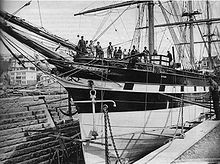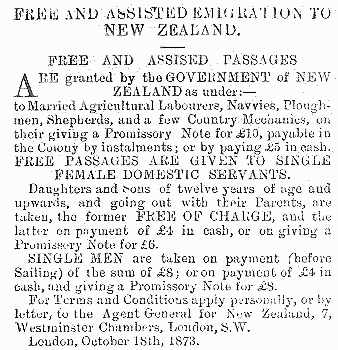 Press F11 to limit top toolbar - Press
again for toolbar to return Press F11 to limit top toolbar - Press
again for toolbar to return"The Mataura"
 Built under the name of Dunfillan, the Mataura (link to Webber Diary of voyage) was launched in 1868, from the yards of Aitken, Glasgow, and purchased by the New Zealand Shipping Company in 1874. She was a full-rigged ship of 853 tons. On the passage to Nelson which arrived 10 November
1875 brought out 216 immigrants, 75 of whom were for Nelson, 40 (included
Ebenezer and Mary Griffin and their family) were for New Plymouth, the
remainder for Marlborough and Westland. A very anxious time was passed by
Captain Gorn when in latitude 44deg south, when sailing through a large
number of icebergs. The ship left England on 8th August with about 250 passengers and carried also some sheep, probably for food but these died on the journey and had to be dispatched overboard. Before leaving the English Channel the passengers were experiencing fog and rolling seas which resulted in many on board being sick. They were treated with arrowroot and brandy which was apparently the standard remedy. During the voyage there were 14 deaths mainly babies and small children and a baby boy was born. Lice was found one immigrant family and the father was forced to throw overboard his family's bedding and clothing. Their possessions lost - it is unknown how they survived the rest of the journey but presumably other immigrants gave them any surplus from their possessions. A passenger Thomas Scott not only wrote a diary (this is a comprehensive account of the voyage but warning: large 7.20 MB pdf download) but he conducted a school on board and included in the pupils were the children of Ebenezer Griffin - Scott recorded them as Ada Mary, 9, Eva 5, Arthur 3 and Rebecca. Scott received a small renumeration from the family for this but during the voyage his wife died aged 55yrs While in the tropics where the hottest day was recorded as 82 degrees F, limejuice was served out to all with an extra ration of water. Highlights of the voyage was enjoyment when a meteor shower was seen crossing the sky one night, whales spouting some distance from the ship and on October 13th, an iceberg was seen. SHIP MATAURA. (Report: Nelson Evening Mail, 11 November 1875, Page 2) This vessel, arrived at the outer anchorage yesterday morning. Our reporter visited the vessel yesterday, and was glad to hear that nothing serious had occurred since the vessel left Gravesend. The first part of the vessel that we visited was the married people's compartment, where they were comfortably lodged, and their berths were a credit to them, both for neatness and cleanliness. The single men are berthed forward, and their compartment was also in an equally clean condition. The single girls compartment is well lighted and ventilated, and excessively clean. The emigrants speak in the highest terms of the urbanity and kindness of Captain Gorn, surgeon-superintendent Patrick Kennedy, and the officers, Messrs R. Metcalf and P. Barnes. Before leaving Gravesend Captain Gorn drew out a code of rules for the guidance of the emigrants in case of fire. Copies were posted up in various parts of the ship, and Captain Gorn feels confident that should a fire have occurred they would have been carried out to the letter. There was also a well organised Fire Brigade, and the boats were well stocked with provisions in case of need. Everything was carried out in its entirety, and speaks well for Captain Gorn and those under his charge. The general health of the passengers has been excellent, and every rational amusement in the shape of readings, concerts, &c., given them. A weekly manuscript paper under the title of the " Mataura Magazine," was published on board, and was a source of profitable amusement to them. It contained contributions from all parts of the ship, some of them being very racy. The Mataura is one of the New Zealand Shipping Company's fleet of clipper ships, and was purchased by them in 1873. She was originally named the Dunfillan, and was built at White Inch, County of Lanark, in 1863. She is a splendid specimen of naval architecture, and remarkably well finished, and a finer ship has never ;left the waters of Blind Bay. Her lines are suggestive of good sailing qualities. The following are her dimensions:� Length, 200 feet; breadth, 33ft 6in; depth, 24ft 4in. She is fitted up with all the latest modern improvements, including iron masts, steel yards, steam winch, and a condenser capable of condensing 300 gallons per diem. Captain Gorn is an old stager in New Zealand, having, been for two years in the pilot service at Port Chalmers. The chief - officer, Mr Metcalf, was here in the barque Mallard as chief officer eighteen months ago. We are indebted to him for the following report: Left Gravesend on August 8, at 3 a.m., and proceeded to sea, having on board 33 married couples, with 29. boys, 31 girls, and 11 infants; 40 single men, 42 single women, 3 cabin passengers, and a crew of 33, making a total of 255 souls. Discharged the pilot on the 10th of the Start; on the 24th the N.E. Trades were fallen in within latitude 35 degs N. having experienced a continuance of westerly gales in the interim. The N.E. Trades proved very light, and were lost in 16 degs N., on the 31st August. From the 31st August to September 5th were in company with and received a visit from the ship St. Leonard's, from London to Wellington, with passengers. From September 1st to 13th experienced the usual variable winds, calms, and rains, when the S. E. Trades were picked up in latitude 1 deg 10 mins N. crossed the Equator on September 14, in longitude 23 degs W., 35 days from the Start. Very moderate S.E. Trades were experienced, the average daily runs being 160 miles, when they were lost on September 23, in latitude 23 S., longitude 32 W. To the end of the month ordinary weather was experienced, but from that date much better runs were made, the vessel averaging from 200 to 280 miles per day. On Oct. 2nd Tristan d'Acunha was sighted, when a run of 325 miles was made, being the only day on the whole passage that the full speed of the ship could be maintained throughout the twenty-four hours. Experienced cold stormy weather with much hail and snow until nearly in the longitude of Cape Lenin. Passed the meridian of Greenwich on October 6, in latitude 39 degs S., and the meridian of the Cape on the 10th, in latitude 42 degs S., the maximum latitude attained being 43 degs South. On October 12th and 13th an enormous quantity of icebergs and floating ice were fallen in with, in latitude 43 deg to 41 degs S., longitude 32 degs to 38 degs E. The ice was so thick that the vessel had to be conned from the forecastle during a whole night and part of next day, and made her way through the pack under easy sail. The ice was never lost sight of for a distance of 180 miles. The meridian of Tasmania was passed on November 3rd, the ship having sailed 7570 miles since October 2nd, being en average of 230 miles per day. Experienced unsteady Northerly and N.E. winds with continued rain and thick weather. Soundings were had South of the Grey River on the afternoon of the 6th instant, but the weather being thick no observations could be obtained, and no progress was made until the morning of November 9, the land off Rock Point being made at noon that day, 91 days from the Start; passed Cape Farewell the same evening, arriving off the Lighthouse yesterday at noon. She spoke the following vessels.� August 13, steamer Northumberland, bound from Melbourne to London, in latitude 49 degs N., longitude 8 degs W.; August 18, ship Slieve Donard, bound from Bombay to Liverpool in 45 degs N., 16 degs W.; August 31st, ship St. Leonards, in company, latitude 16 degs N., longitude 27 degs W.; September 2, ship British Consul, bound from London to Calcutta, 26 days out, in latitude 11 degs N., longitude 27 degs W,; September 5, parted company with the St Leonards in latitude 8 degs N., longitude 24 degs W. The Mataura brought three cabin passengers for Otago� Mr and Mrs Binney and son. She will sail for Port Chalmers about Saturday next. The following testimonials were presented to the captain and doctor yesterday. To Captain John Gorn, ship Mataura, Nelson. Dear. Sir�We, the undersigned emigrants, for ourselves and families, on the successful termination of our long voyage, from London, England, to this port, at a meeting held last evening unanimously agreed to accord yon our best wishes for your future prosperity through life. We could not separate after our three months connection with you on board the ship you so ably commanded, without testifying our appreciation of your exertions in promoting our welfare. We trust you may be spared in health and strength to fulfil your present position, and that others, who like ourselves may be placed under your guidance and rule, may find you even more competent from your experience to conduct them as successfully as we have been, and that the Company under whose flag you sail may always find you, as we feel assured they will, a workman that needeth not to be ashamed We would also through you convey to your officers and crew our feeling of thankfulness to them for their services in bringing to so happy an issue under, your command the great undertaking we have been engaged in, and that to-day through your joint exertions we can look at length on our desired haven, Nelson, and our future country and home, New Zealand. We cordially wish them every success and blessing through life, and subjoin our signatures to the address in confirmation of the above. (Signed by Thomas Scott and other immigrants) To Surgeon-Superintendent P. Kennedy, Esq., ship Mataura, Nelson. Dear Sir: We, the immigrants by the above-named
ship, so safely arrived at our destination this day, cannot allow you to
part from us, after having been for the past three months, many of us
individually, under your professional treatment as a physician, and as
immigrants collectively under your general superintendence as a
surgeon-superintendent, without testifying to your skill as a medical man.
As a testimony to the manner in which you carried out the general control
of all during the voyage, causing them thereby to estimate very highly the
urbanity and kindness exemplified by you at all times, and often in very
distressing and painful circumstances, we heartily wish you, Dear Sir, all
prosperity in your career in whatever part of the world you may determine
to settle, and trust that every blessing may be yours so long as life
shall last. (Signed by Thomas Scott
and other immigrants.) Taranaki Herald, 13 November 1875, Page 2 IMMIGRANTS BY THE
'MATAURA.' Married: Single Men. Single Women. |





